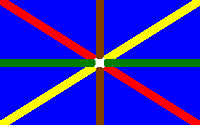Gryphon Avocatio/Sxiróþes
| Shirerothian ConLang (Præta Sxiróþes) | |
|---|---|
| Pronunciation: | {{{pronunciation}}} |
| Spoken in: | Shireroth |
| Region: | National |
| Total speakers: | 0 |
| Language family: | Shirerothian Languages |
| Writing system: | {{{alphabet}}} |
| Official status | |
| Official language in: | Shireroth |
| Regulated by: | Gryphon Avocatio |
Introduction
This page is a bit of a public scratch pad for the proposed Shirerothian Language. Sxiróþes is the genitive form of the word for Shireroth in the language, and in this case is short for Præta Sxiróþes, meaning, roughly, Shireroth's Speech.
For the discussion, see this thread and others forthcoming in the University.
Alphabet
The proposed alphabet for the language is as follows:
Aa Bb Cc Çç Dd Ðð Ee Ff Gg Hh Ƕƕ Ii Jj Ll Mm Nn Oo Óó Pp Rr Ss Tt Þþ Uu Vv Ww Xx Yy Zz
Morphology
Nominal Morphology
Nouns in Shirerothian decline for number and case, based on gender. There are two numbers, singular and plural; two genders, "masculine" and "feminine"; and four cases.
Masculine Nouns
Masculine nouns end in consonants. In the fictional history of this language, there were distinguishing vowels at the ends of masculine nouns, but they were subsequently lost and now only the feminine forms have vowels word-finally.
| Singular | Plural | |
|---|---|---|
| Nominative | -e | |
| Accusative | -a | -e |
| Genitive | -es | -ese |
| Prepositional | -i | -im |
Feminine Nouns
Feminine Nouns are those generally ending in either the letters 'a' or 'o', although other nouns and pronouns ending in vowels uses the following suffixes to display case as well. Some irregular nouns, like jor, "yesterday", take feminine suffixes, despite their ending in consonants
| Singular | Plural | |
|---|---|---|
| Nominative | -ne | |
| Accusative | -n | -ne |
| Genitive | -nes | -nese |
| Prepositional | -ni | -nim |
Phonology
The following is a simplified vowel chart. All of the sounds here match their orthographic equivalent except for [ø], which is written 'ó' in the alphabet. The segments in () are not phonemes, but the result of vowel harmony.
| [-back] | [+back] | |
|---|---|---|
| [+high][-low] | i (y) | u |
| [-high][-low] | e (ø) | o |
| [-high][+low] | æ | ɑ |
The vowel harmony rule for the language is very straightforward. [-low, -back] vowels (that is, o and u) become [+front] when the next vowel in the word is [-low, +front] (i.e. i and e). This is represented in the orthography by the changes from o→ó and u→y. For instance
- læjo "road" → læjóne "roads"
Pronouns
Personal Pronouns
The personal pronouns essentially follow the same declension rules of the normal nouns. The feminine 3rd person forms also have shorter versions typically used in speech and less formal contexts. The longer versions are to be found in higher prose and poetry. Likewise, the language differentiates between feminine and masculine in the first person in formal contexts, but both genders can uses the masculine forms.
There is also a third person non-gender-specific pronoun (3N) to be used in situations where gender is unclear (in singular) or in conditions where there are groups of people that are not all of the same gender (plural). Its form is currently subject to change, depending on the adoption of a separate Neuter Gender.
| Singular | 1(M) | 1F | 2 | 3M | 3F | 3N |
|---|---|---|---|---|---|---|
| Nominative | æj | æjo | þu | el | elo | e |
| Accusative | æja | æjon | þuna | ela | elona / elna | en |
| Genitive | æjes | æjónes | þynes | eles | elónes / elnes | enes |
| Prepositional | æji | æjóni | þyni | eli | elóni / elni | eni |
| Plural | 1(M) | 1F | 2 | 3M | 3F | 3N |
| Nominative | æje | æjóne | þyne | ele | elóne / elne | ene |
| Accusative | æje | æjóne | þyne | ele | elóne / elne | ene |
| Genitive | æjese | æjónese | þynese | elese | elónese / elnese | enese / ese |
| Prepositional | æjim | æjónim | þynim | elim | elónim / elnim | enim |
Possessive Pronouns
Shirerothian does not indicate possession as it does in English. In English, -'s clitic is typically attached to the end of a noun phrase to indicate that the noun phrase to which it attaches possesses the following noun:
- [John]'s house
- [The man]'s house
- [The guy I saw you with]'s house
Shirerothian can do this to some extent, which is what the genitive form of nouns can do:
- se ræd Eriçes (= Erik's house)
- se ræd æjese (= our house)
The language has will also have possessive pronouns that looks something like the following English equivalents. They are syntactically equivalent to -'s above, but are separate words:
- [the man] his house (=the man's house)
- [the woman] her daughter (=the woman's daughter)
- [that guy I thought I saw you with] his cat (=that guy I thought I saw you with's cat)
It can also indicate possession through the use of the preposition að:
- se ræd að Scoti (=the house of Scott's)
Demonstrative Pronouns
To come!
